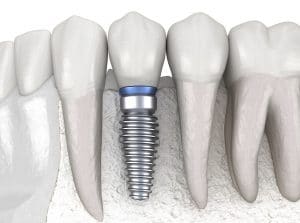 Losing one tooth doesn’t seem as significant a problem as losing several or most of your teeth. However, tooth loss to any degree can be highly detrimental to your long-term oral health and the integrity of the rest of your smile. Because of this, losing one tooth can mean that you’re much more likely to experience more extensive tooth loss in the future. This is largely due to the effects that result from losing the tooth’s root, and with a dental implant and crown, you have a good chance of mitigating these effects to reduce the risks of further tooth loss.
Losing one tooth doesn’t seem as significant a problem as losing several or most of your teeth. However, tooth loss to any degree can be highly detrimental to your long-term oral health and the integrity of the rest of your smile. Because of this, losing one tooth can mean that you’re much more likely to experience more extensive tooth loss in the future. This is largely due to the effects that result from losing the tooth’s root, and with a dental implant and crown, you have a good chance of mitigating these effects to reduce the risks of further tooth loss.
What happens when you lose a tooth?
The most significant effects of tooth loss aren’t always the one that you notice immediately. For example, losing a tooth root is one of the most impactful aspects of tooth loss, as the root is responsible not only for supporting your tooth but also for stimulating your jawbone. The loss of this root can continue to impact your smile even after replacing the visible part of your lost tooth. This makes a dental implant post particularly beneficial for restoring your smile. With it, your replacement dental crown can more fully restore the function of your lost tooth.
The advantages of a dental implant and crown
The restoration of your lost tooth root is the greatest advantage to replacing a lost tooth with a dental implant crown. The loss of stimulation from the missing tooth root can have greater impacts on your oral health than you might realize, and if not addressed, it can be the driving force behind your increased risks of further tooth loss. For instance, when the area of your jawbone where you lost the tooth stops receiving stimulation from the root, the bone structure can begin to lose mass and density over time. This causes the dental ridge to grow weak, and if the stimulation isn’t reestablished with a dental implant post, it can lead to the loss of mass and density throughout other areas of your jawbone.
Upgrading your dental bridge with an implant
If you’ve already replaced a lost tooth with a more conventional dental bridge, then you can still benefit from the advantages of a dental implant crown. If you qualify, your dentist can suggest removing the bridge and having a dental implant post placed in the bone structure, then securing a custom-designed dental crown to the post after your jawbone has healed.
Learn more about dental implant crowns
Replacing a lost tooth with a dental implant crown not only restores your smile, but also lowers your risks of losing any more teeth in the future. To learn more, schedule a consultation by calling the Dental Centre of Conroe in Conroe, TX, today at (936) 441-4600.




